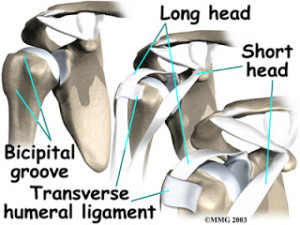Orthopedic Exam / Special Tests for Physical Therapy: SHOULDER
Biceps tendon instability of the long head of the biceps tendon in the bicipital grove can result in pain in the front of the shoulder. Biceps tendon tears can occur from repetitive trauma such as throwing, overuse, or from an injury. Many of these tears are partial tears of the tendon and may be difficult to diagnose. They may occur inside the shoulder joint or outside the joint along the front of the arm. When there is instability of the biceps tendon, there may be popping noted in the front of the shoulder associated with pain along the biceps. When the biceps tendon is torn or is unstable in its grove, it will not heal or improve on its own.
http://www.drkhalfayan.com

Special Test: Yergason’s Test:
PURPOSE:
- To test for the stability of the biceps tendon and the integrity of the transverse humeral ligament
Video Demo Instructions, Procedure, Positive Test:
Special Test: Yergasons Test: Video Demo (Procedure below)
Special Test: Yergasons Test: PROCEDURE:
• Patient is seated or standing.
• Examiner’s one hand stabilizes the patient’s elbow against the patient’s body
• Therapist’s other hand applies resistance as the patient actively supinates their forearm, extends their elbow, and externally rotates their humerus
Special Test: Yergasons Test: POSITIVE SIGN:
- Pain or clicking and snapping at the area of the bicipital groove
* The patient will exhibit a pain response, snapping or both in the bicipital groove. Pain with no associated popping might indicate bicipital tendinopathy. A snapping indicates a tear or laxity of the transverse humeral ligament, which would prevent the ligament from securing the tendon in the groove. Pain at the superior glenohumeral joint is indicative of a SLAP tear.
Yergason’s Test Sensitivity / Specificity: